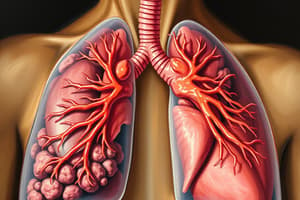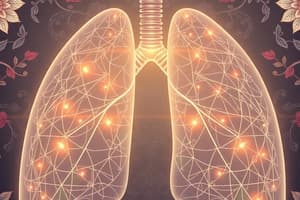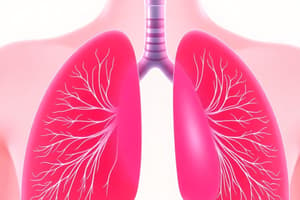Podcast
Questions and Answers
What is the primary issue that affects gas exchange in the lungs?
What is the primary issue that affects gas exchange in the lungs?
- Increased lung compliance
- Effective airway resistance
- Narrowing of the airway (correct)
- Reduced blood flow
Which factor can lead to a change in lung function?
Which factor can lead to a change in lung function?
- Obesity (correct)
- Nutritional habits
- Age
- Holiday travel
What occurs to oxygen during the process of gas exchange?
What occurs to oxygen during the process of gas exchange?
- It is bound and released by hemoglobin (correct)
- It increases in concentration in deoxygenated blood
- It reacts with carbon dioxide in the lungs
- It decreases before reaching the tissues
What does impaired gas exchange lead to in the body?
What does impaired gas exchange lead to in the body?
What happens during forced expiration?
What happens during forced expiration?
Which condition can stimulate pulmonary edema?
Which condition can stimulate pulmonary edema?
What physiological response occurs to compensate for low oxygen levels?
What physiological response occurs to compensate for low oxygen levels?
What role does surfactant play in lung function?
What role does surfactant play in lung function?
Which of the following indicates the effective transport of oxygen in the blood?
Which of the following indicates the effective transport of oxygen in the blood?
What is a result of the mechanical effort of breathing in patients with certain lung conditions?
What is a result of the mechanical effort of breathing in patients with certain lung conditions?
What effect does low hemoglobin have on oxygenation?
What effect does low hemoglobin have on oxygenation?
Which heart phase is primarily responsible for ejecting blood?
Which heart phase is primarily responsible for ejecting blood?
What is a common consequence of clogged coronary arteries?
What is a common consequence of clogged coronary arteries?
Which condition is associated with fatigue due to low oxygen supply?
Which condition is associated with fatigue due to low oxygen supply?
What visual symptom may indicate low oxygen levels in the body?
What visual symptom may indicate low oxygen levels in the body?
What role do bronchodilators play in respiratory treatment?
What role do bronchodilators play in respiratory treatment?
What is the impact of structural damage to the heart valves?
What is the impact of structural damage to the heart valves?
Which of the following factors contributes to the heart's workload?
Which of the following factors contributes to the heart's workload?
What physiological change occurs with tachycardia?
What physiological change occurs with tachycardia?
What does a heart murmur typically indicate?
What does a heart murmur typically indicate?
Flashcards are hidden until you start studying
Study Notes
Respiratory System Dysfunction
- Function Issue: Difficult to rid airway of substances
- Strutter Issue: Damaged or malfunctioning aviali
- Effort to relax, contract, and breathe
- Narrowing of airway caused by asthma, choking, pulmonary edema, broken rib
- Diculased Compliance is stimulated by rishmathy to 8 u's
- Expanding and Contracting of lungs: Inhaling oxygen and exhaling carbon dioxide.
- Recoil of lung maintains surface tension
- Impaired Gas-Exchange: plebicates aloes
- Nasal flaring, abdominal muscles raising, and shoulders rising are all signs of respiratory distress.
- Oxygenated Blood: Dispersed throughout the body
- Factors that can alter lung capacity: Pregnancy, obesity, disorders, physical activity
Lung Volumes
- Amount of air exhaled after normal expiration: Tidal Volume
- Amount of air left in the lungs after a normal expiration: Residual Volume
- Maximum amount of air exhaled after a forced expiration: Forced Vital Capacity
Consequences of Respiratory Distress
- Increased Heart Rate: To compensate
- Flood of fluid in a part of the lung (ramous tdFhpuuae)
Hemoglobin
- Hemoglobin transports oxygen.
- Hemoglobin binds with oxygen.
- Oxygen detaches from hemoglobin.
Oxygen Deficiency
- Low oxygen or hemoglobin leads to fatigue.
- Involuntary breathing
- Oxygenation
Heart
- 4 Chambers: Right Atrium, Right Ventricle, Left Atrium, Left Ventricle
- 4 Valves: Tricuspid Valve, Pulmonary Valve, Mitral Valve, Aortic Valve
- Systole: Ejecting blood
- Diastole: Filling with blood
- Stroke Volume: The volume of blood ejected during systole
- Starling’s Law: More stretch, more contraction.
- Heart Murmurs: Issues with valves
- Clogged Coronary Arteries: May lead to heart attack
Circulation
- Cardiac Output: The amount of blood pumped by the heart per minute (4-6 Liters).
- Blood Flow and Resistance: Blood flow determines the amount of work resistance.
- Ejection Fraction: Percentage of blood ejected by the heart during systole.
Blood Issues
- Low Blood Count: Low red blood cell count
- Low Hemoglobin: Low hemoglobin level
- Hemoglobin binds with oxygen.
Anemia
- Anemia is a condition when the blood does not have enough healthy red blood cells to carry oxygen.
- Anemia can be caused by a variety of factors, including iron deficiency, vitamin B12 deficiency, and chronic diseases.
Signs and Symptoms of Respiratory Illness
- Numbness and tingling
- Headache
- Lightheadedness
- Mental status changes
- Blue coloring of the lips, nose, and fingertips
Treatments for Respiratory Illnesses
- Bronchodilators
- Oxygen therapy
- Antibiotics, if the infection is bacterial
Studying That Suits You
Use AI to generate personalized quizzes and flashcards to suit your learning preferences.




